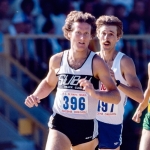As We Join Our Show, Steve, Is, As Usual, Running

Can young Steve Scott, Miler and soap opera junkie, find happiness and success with a world record? You can bet he'd like to find out
By Kenny Moore, Sports Illustrated
Call it the Seven-Per-Cent Problem. A Miler running at 15 mph—or 4 minutes per Mile—spends a tenth of his energy just overcoming wind resistance. At least a front-runner does. Those following within a yard or two benefit from the leader's setting the air behind him in motion. Spared 70% to 80% of the resistance of still air, the followers can therefore keep to the leader's pace with approximately 7% less work.
As in cycling and auto racing, the efficacy of such drafting means that in a race among equals the pacesetter practically never wins. Thus the need for sacrificial rabbits in record attempts. Too, this explains the dawdling, wait-and-kick races that usually develop in major rabbitless events like the Olympic 1500 meters. It means that any Miler who wants to go hard the whole way and so approach his true limits not only has the distance and the watch to strain against but also that 7% penalty for taking charge of the pace.
Steve Scott, 25, America's best Miler since 1977, has accepted that penalty in almost every important race he has run. He has chosen to simply override it with at least 8% more courage. And each year, inexorably, he has improved, until now he's the second fastest U.S. Miler ever, with best times of 3:51.11 for the Mile and 3:33.33 for 1500 meters, only the thinnest of margins short of Jim Ryun's 14-year-old American records of 3:51.1 and 3:33.1. After winning the Pepsi (3:52.50) and Jumbo Elliott (3:52.26) Mile races in May, Scott seems a sure bet to finally break Ryun's records this summer in Europe. He is probably capable, on a perfect day, of breaking Steve Ovett's world records of 3:48.8 and 3:31.36 as well. It is always possible, however, that Scott might do just that but not find himself in first place when he crosses the finish line.
Scott's determination to run hard miles has not always pulled him clear of the competition. Twice he has led Ireland's Eamonn Coghlan into the last 440 of indoor Mile races in San Diego. Twice Coghlan has kicked away to set world indoor records of 3:52.6, in 1979, and 3:50.6, last February. In the Oslo Golden Mile of 1979, Scott escaped from all but one of the field on the third lap, but that one, England's Sebastian Coe, kicked away to win in a world record 3:49.0. Had Scott not inexplicably relaxed a few steps before the finish, he would have saved the .02 of a second needed to take Ryun's American record.
The refrain after these races was always the same. "You have to give Scott credit for the record," said Coe, for example. "He kept the pace on all the way." Other Milers now look to Scott to take the initiative; they plan their races around it. "When Scott didn't lead, it surprised me," said Ireland's Ray Flynn after losing to him in January's Sunkist Indoor. "I had to rethink the whole race."
Scott's history is one of remarkable doggedness in a craft that quickly separates the truly determined from the merely desirous. "Steve is the most congenial, friendliest, least temperamental of all Milers," says Steve Lacy, who finished second to Scott in the U.S. Olympic Trials 1500 a year ago and has run a 3:33.99, the third best by an American.
Continue reading at: sportsillustrated.com
